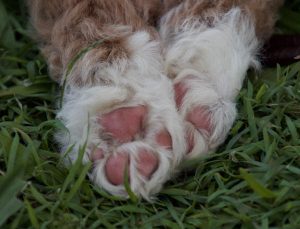PROTECTING YOUR PUPPY'S JOINTS AS IT GROWS TO ADULTHOOD
This section was previously titled RAISING YOUR LARGER BREED COBBERDOG PUPPY, however it is now obvious that it applies to ALL puppies as they grow. A quick search shows that the small breed bulldogs, pugs and corgis are on the list of most afflicted by hip dysplasia and joint development/damage issues, so it is well worth taking precautions to protect your large or small pups joints as it grows to prevent joint problems in adulthood.
Dogs can be vulnerable to damage of skeletal structures as they grow if not managed well. Puppies are not fully grown skeletally until 12 months of age. Their growth plates in their joints are still soft, ligaments and tendons are under-developed, and muscles are still developing their strength and support. Your puppy needs to be able to safely burn energy, and be stimulated and socialised, without risk to the developing joints.
And good training also helps your Cobberdog pup to be calm, attentive and obedient so that he is easy to care for and manage, and pleasant to be around, especially if it will be a larger size dog!
At Ridgy Didge, we do everything possible in breeding and early puppy care to ensure the best possible health and handling of all our sizes of Cobberdog puppies. Now it’s up to you to look after your pup as it continues to grow and develop, to prevent skeletal, joint, muscle or ligament damage; and to help it become a calm, manageable family companion.
Follow our guidelines below, and be confident that your pup will have the best chance of reaching its full potential of physical health and companionship.
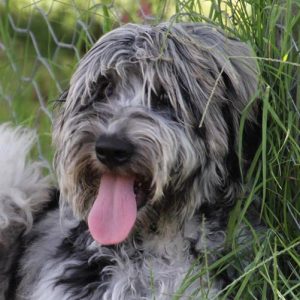
Ridgy Didge Guide for
Protecting the joints of your Cobberdog Puppy
1 Precautions
Help your puppy to avoid activities and situations that may increase risk of stress on the skeletal structures.
- Keep the hair between the footpads short, to prevent slipping and injury.
- Avoid 'forced exercise' - when puppy can't stop when he needs or wants to stop he will experience physical and joint stress!.
* Puppies don't need 'walks'; play at home is enough exercise for puppy. But definitely take puppy out and about and rest on a leash for socialisation.
* Never lead your puppy from a bicycle, this is far too stressful. - Avoid slippery surfaces; put mats down in walkways if you have tiles or polished floors, avoid vigorous running on very wet grass.
- Avoid soft sand at the beach, take puppy on the hard sand which is less stressful on joints.
- Avoid letting your pup jump on and off the bed or couches, or in and out of cars.
- Avoid allowing your pup to run up and down stairs - it is the repetitive impact and possible slipping that may cause the damage.
- Always supervise your pup around other bigger dogs, and children. Big dogs can be rough on your pup's joints (as well as safety issues), and children may pick up incorrectly or drop the pup, causing skeletal strain.

2 Feeding for steady growth
Visit this page for our full recommendations around feeding your puppy.
WHY? It is important that your puppy does not become overweight. Overfeeding and incorrect nutrition can cause growth that is too rapid and may cause joint stress. In a healthy pup, you should be able to feel the ribs under the skin and sub-cutaneous fat, but you should not see the ribs. You should provide appropriate food, to promote steady growth in your puppy.
WHAT? We recommend raw balanced quality food. You can prepare your own raw food (it MUST be completely balanced including meat, fat, offal, eggs, sardines and vegetables) or there are some commercially available dependable brands of quality raw and kibble food (Raw4Paws, Ziwi, Whoa Nelly, Proudi, Organic Paws). Many processed puppy foods are very high in calories, minerals and protein, and this can accelerate your puppy growth if not monitored. To help keep yourpuppy’s growth rate steady, avoid high energy processed food. Do your research around food products and puppy food, and check with your vet. We recommend grain-free food for all stages of life.
HOW MUCH? We feed our older pups twice daily. Overfeeding will increase your pup's growth rate, and put unnecessary strain on muscles, joints and the skeletal system. Remember to always measure the food for the recommended weight of your growing puppy; don’t simply eye-ball the amount and never leave food accessible all day. Check with your vet to see best food quanitites for your pup/dog.
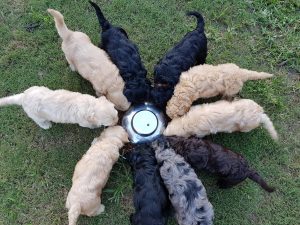
3 Appropriate Exercise
- Regular small daily exercise (play) is important, rather than nothing during the week and too much on weekends! Puppies don't need 'walks' - play at home is approproate exercise.
- Avoid forced exercise where the puppy can’t stop and rest - avoid jogging on the beach on soft sand, avoid long uninterrupted walks, do not lead your puppy while riding a bike.
- Avoid rough or excessive play with people and other dogs; limit ball throwing time, avoid too much 'rough and tumble’.
- Mental stimulation is an excellent form of appropriate exercise for puppy - see below.
4 Mental Stimulation
Providing mentally stimulating toys and play is another great way to keep your pup calmly ‘exercised’ and interested. You may be surprised just how tired and calm they become with these types of interaction.
Try giving your puppy a Kong toy, which takes the pup time and persistence and mental challenge to get some little morsels of food. Hiding a ball and hide-and-seek games are great for fun, stimulation and bonding. Training is included in this area of mental stimulation, especially leash training - your puppy is mentally stimulated and alert to your cues. See our Ridgy Didge Puppy Leash Training Guide.
A great way to challenge your puppy and dog mentally, is to play scent games. This article at Doggie Solutions is a great summary of 5 scent games that your puppy will love!
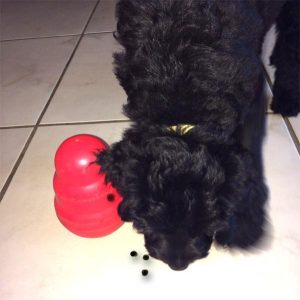
5 Training and Socialisation
Training and socialising will go a long way to creating good manners and manageability in your Cobberdog, and this goes hand-in-hand with obedience and calm behaviour and joint safety. Start early, make training frequent, and be consistent. Ensure your puppy clearly understands his order at the bottom of your family pack. Remember that when your Cobberdog puppy is a larger dog, many of the seemingly cute puppy behaviours may be unpleasant, threatening and even unsafe especially around small children. These behaviours include jumping up, standing against you, growling and nipping, pulling on the leash, rushing ahead out the doorway, jumping up onto furniture and bedding, etc. Discourage these behaviours early in your small puppy before it becomes a bigger, stronger, determined dog.
See our Puppy Training drop-down menu for a growing list of Ridgy Didge Guidelines for training, including Child Safety, Toilet Training, Crate Training, and Leash Training.
For information on early socialisation, see our Blog 'Socialise Your Puppy Early'.
For information about setting early discipline and establishing your puppy's order at the bottom of the family pack, see our Blog 'Sharp Little Puppy Teeth!'
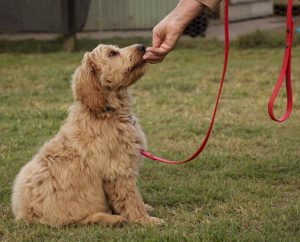
6 Grooming
It is important to keep the hair on the pads of your puppy's feet short to reduce the risk of slipping on surfaces. Condition your puppy from the start to enjoy grooming, including bathing, brushing, ear care and clipping. Once the pup is larger and stronger, it is much more difficult to clip and groom him if he is uncooperative! See our Puppy Grooming page for more details.
